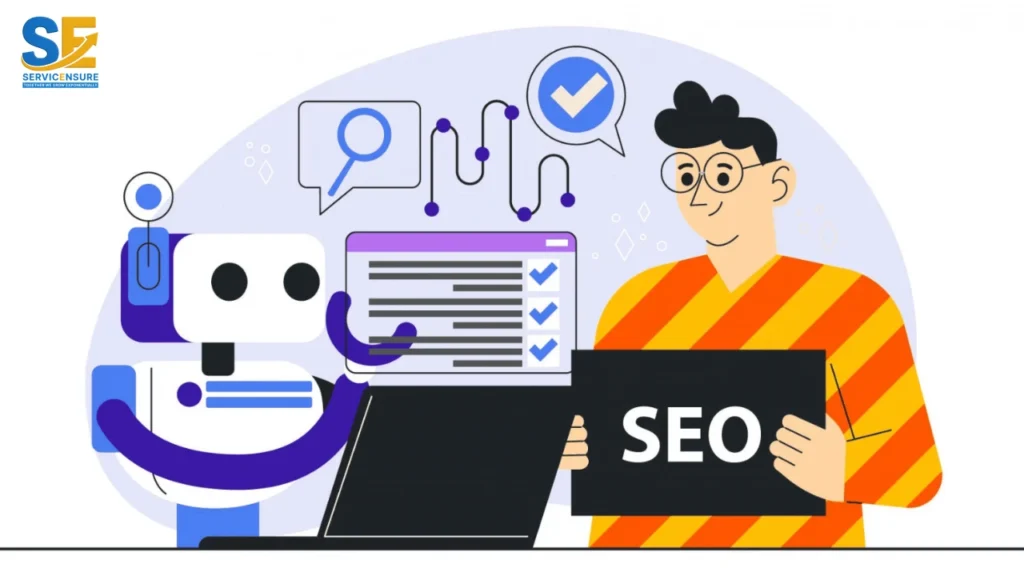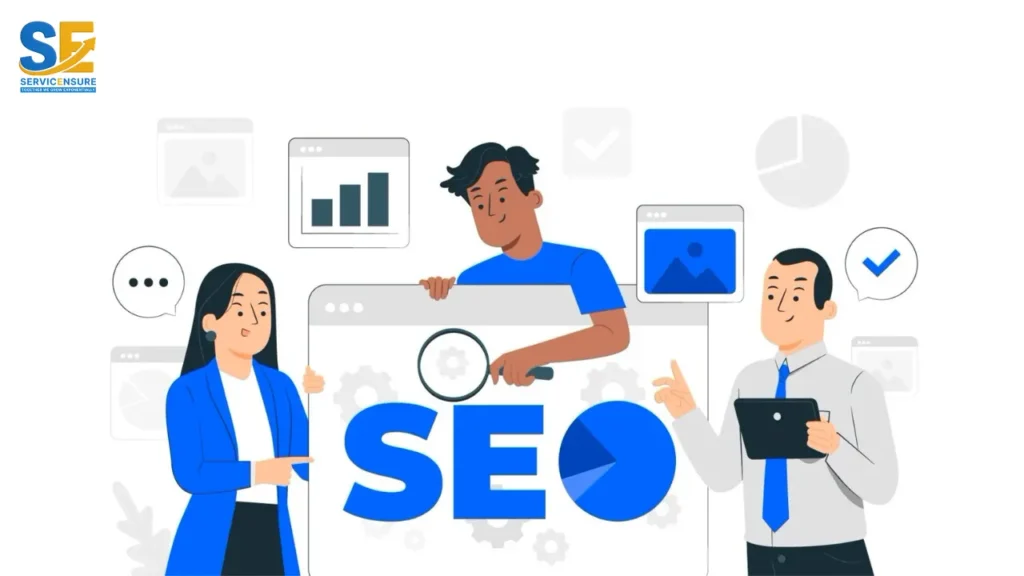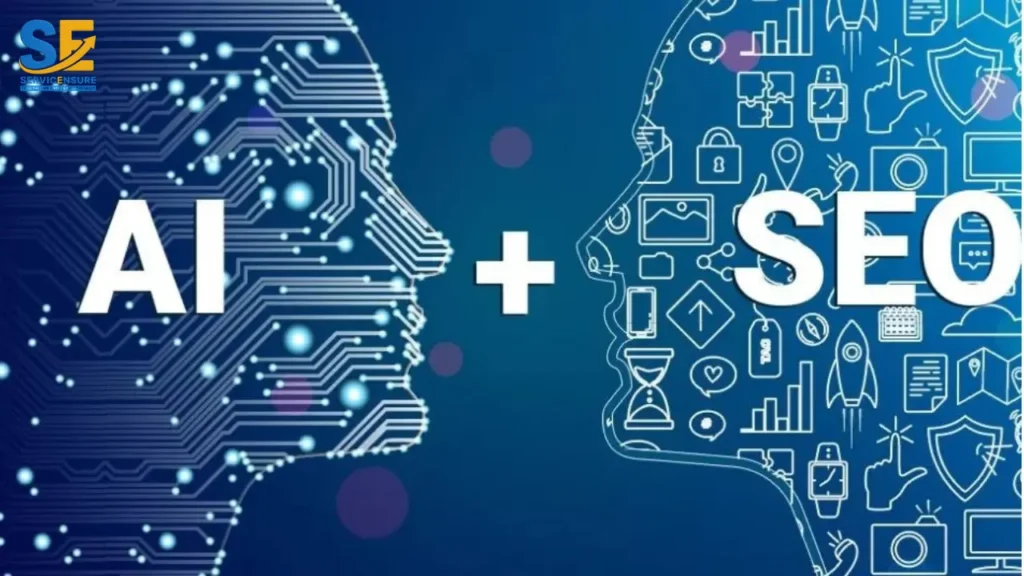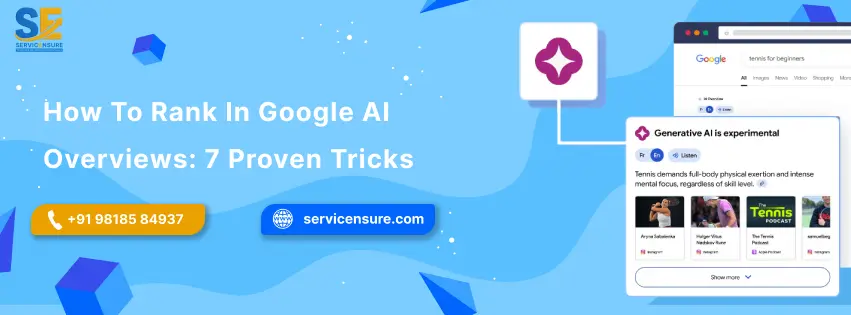With the passing of each day, artificial intelligence has been growing more advanced, and its usage has become common in the digital marketing sector. Due to this, many people are concerned about traditional digital marketing practices, especially SEO. The practice of SEO is done to improve the ranking of a website, but since the rise of AI, users’ queries are answered at the top of the result pages, without requiring the user to open a website. So, does this mean that even the most proven SEO techniques are redundant? While AI has drastic impacts on SEO, the practice is not redundant. In this article, we will discuss the impact and future of SEO with AI.
The Impact of AI on SEO
While there is no denying that some proven SEO strategies are now outdated, even the top SEO services in Gurgaon did not hold the traditional practices for long. The impact of AI on SEO made it clear that the traditional SEO practices were no longer capable enough to bring in the desired results. However, this does not mean that the entirety of SEO has failed to compete with AI. On the contrary, AI tools, such as ChatGPT, are used to craft new and better SEO strategies to help a website rank higher in not only search results but also in AI results, and the future of SEO with AI is expected to revolve around such tools.
Below, we have discussed the key ways in which SEO in AI age has been impacted.
1. Keyword Research
The glimpse of AI’s impact on SEO was displayed in the area of keyword research. Keyword research is one of the most crucial aspects of SEO, as it helps to target the right group of audience and encourage them to interact with your business.
As essential as this aspect is, there is no denying that it is a highly time-consuming task when done with traditional methods. By using AI for this purpose, however, the entire process of keyword research can be done in no more than a few hours. Furthermore, AI tools will also provide you with variations of these keywords.
2. Craft Content
By effectively using AI tools, you can now craft quality content that is relevant to both the audience and your business. As the content is optimized for search engines and includes optimal keywords, it can be ranked in both AI overviews as well as search results. However, the content created with AI does not always align with E-E-A-T (Experience, Expertise, Authoritativeness, and Trustworthiness), LLMs (Large Language Models), and the search intent of users, especially in technical areas or YMYL (Your Money, Your Life). While this issue is not exactly a hard roadblock to overcome, AI tools are expected to improve further and craft relevant as well as quality content.

3. Data Analysis
Digging through Search Console, GA4 dashboards, and third-party SEO tools is a challenge in its own. Even though there is a wealth of insight buried in their data, digging through it is not the most optimal choice, as it can be highly time-consuming. Instead, use AI tools to summarize, analyze, and spot patterns.
By directly uploading the entire data in an AI tool, you will be able to complete hours’ worth of tasks within a few minutes. Many companies have used AI for this purpose, and the results have suggested that the future of SEO with AI is only going to improve further.
4. Update Existing Content
The market trends of every niche keeps on evolving, and the previous factors keep updating. This can make previous posts of your website irrelevant and can even impact the overall ranking. Numerous marketers use AI tools to analyze the shifts in trends and update their content. Furthermore, these tools can also assist with comparing previous content with the latest updates, and the usage of such tools is expected to increase drastically.
By analyzing the changes, you can update the previous content to make it relevant to the current market trends. While AI tools can still provide optimal results in this area, the future of SEO with AI is expected to further assist in improving both the quality as well as quantity of content.
5. Streamline Workflow
In addition to assisting with the factors we have listed above, AI tools are also more than capable enough to streamline entire SEO workflows. This helps the company to free up its manpower on repetitive tasks and focus on crafting better strategies as well as promoting creative workflow.
Repetitive tasks, such as keyword research, competitor analysis, site audits, etc., can all be completed quickly with AI tools. This displays that using SEO with AI holds a lot more potential than many have expected.
Contact us now and get a free audit of your website

The Future of SEO
Before AI, the practices of SEO were done with a single purpose: to improve a website’s ranking on Search Engine Result Pages (SERPs). This meant securing the position within the top ten search results with the relevant keywords. Now, AI provides answers to specific queries at the top of search results. Due to this, users do not need to scroll down to even the top five. For this reason, businesses will also need to ensure that they are also ranking in AI overviews in addition to the top of search results. Although this has drastically changed SEO, the mentioned below aspects are expected to further change the future of SEO.
1. No Clicks SEO
There was once a time when the practice of SEO was used to encourage the audience to click on the website. Nowadays, however, the practice has changed radically and is used to optimize content so that it directly appears on search engine result pages. As a result of this, users can get answers to their queries without needing to click on a single website.
This is also referred to as “zero-click searches,” and about 60% of Google searches on mobile have ended without opening a single website. However, do note that it does not mean that traditional SEO is dead now. On the contrary, the use of both practices is essential to rank on search as well as AI results.
2. Structured Data Will Be The New “Language of AI”
The year 2025 displayed that structured data is no longer optional for AI search but essential. This became one of the clearest indicators that AI models rely on the structure of the data to interpret the content accurately and decide whether to show it to users or not. This understanding is provided through schema markup. Schema markup is a code that is placed on the header of webpages. This code provides AI systems, such as Large Language Models, with structured and contextual data so that they can accurately understand and interpret the content of a website.
3. AI Tools Will Update SEO Workflow
In the industry of digital marketing, the use of AI has officially become the mainstream for search engine optimization. Moreover, in the year 2025, over 86% of SEO professionals have used AI in their workflows. The AI tools were used for multiple tasks of SEO, and we expect that their usage is going to increase further. However, do note that the use of AI tools does not necessarily mean that the traditional SEO practices are dead, but have been updated and will continue to update as AI tools grow further. Furthermore, according to Demandsage, marketers who used AI tools in 2025 for SEO purposes were able to see around a 45% boost in organic traffic. This indicates both SEO and AI are assisting one another to improve further.
AI Search vs SEO (Topical Authority vs Domain Authority)
When looking at AI search vs SEO, there are two crucial factors that need to be checked, which are topical authority and domain authority. Both topical authority and domain authority are essential factors of SEO that determine how well a website ranks on search engine result pages. Topical authority refers to a website’s expertise and credibility on a specific subject. Domain authority, on the other hand, is a ranking factor that tells search engines the authority of a particular domain.

While domain authority is among the traditional factors of SEO, topical authority, however, is related to AI. This is because it tells search engines to evaluate and rank content. Unlike domain authority, topical authority does not solely rely on keywords. Instead, it judges the content based on its trustworthiness and expertise to a specific subject. This means that a website with high topical authority is more likely to be ranked in AI-driven features, like AI overviews.
So, which is important for your business? While both are important factors of SEO, prioritizing topical authority is the optimal choice. This is because domain authority can take months or even years to build on a new website. Whereas topical authority requires you to pick a small sub-niche to your industry and be the ultimate expert. However, a good balance of both can ensure rankings in both AI overviews and search results.
For an in-depth look at why SEO is essential in this AI age, you can check out our article on Top 10 Reasons Why Your Business Needs SEO
How AI Is Changing SEO?
Since the rise of AI, the capabilities of SEO have not decreased; as a matter of fact, they have spread further. This means that AI has not overtaken SEO, but has assisted it to provide better and quicker results. To sum it up, the future of SEO with AI is expected to provide promising results for businesses of all niches and scales. Moreover, with the right tools and practices, a business can secure top rankings on both search results and AI overviews.
FAQs
Has AI replaced SEO?
No, AI has not replaced SEO, but it has assisted in transforming the practice to provide better results by accelerating multiple tasks.
What does the AI overview in SEO mean?
This refers to AI-generated summaries that rank on the top search result pages.
How do companies use AI with SEO?
Companies make use of AI tools in their SEO practices for keyword research, competitor analysis, and a number of other repetitive tasks. They also use AI to improve the quality of the content and make it more relevant to the users.
What does machine-readable content mean?
This refers to content that AI tools can understand. This content includes multiple aspects, such as clear formatting, clean structure, as well as a proper schema.
How to use AI for keyword research?
AI tools can be used to generate a single seed keyword, then using it to generate keyword clusters. As these keywords will be based on the search intent and relevance, they will be targeting the right group of audience.

Aadiv Atharv is a results-focused Digital Marketing Specialist with expertise in performance marketing, social media strategy, and conversion optimization. He excels at crafting creative, ROI-oriented campaigns that help brands connect with the right audience. His blend of creativity and technical skill makes him a powerful force in today’s competitive digital landscape.



